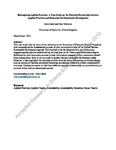Reimagining Applied Practices: A Case Study on the Potential Partnership between Applied Practices and Education for Sustainable Development
| dc.contributor.author | Cahill, Alex | |
| dc.contributor.author | Warwick, Paul | |
| dc.date.accessioned | 2019-02-19T13:46:45Z | |
| dc.date.issued | 2019-07-07 | |
| dc.identifier.issn | 1356-9783 | |
| dc.identifier.issn | 1470-112X | |
| dc.identifier.uri | http://hdl.handle.net/10026.1/13317 | |
| dc.description.abstract |
This case study tells the story of two educators at the University of Plymouth (United Kingdom) who reconsidered the fundamental purpose of their curriculum in light of the United Nations Sustainable Development agenda. This resulted in the development of a new community-engaged applied practice module during the final year of the Theatre and Performance degree. Reflection on their innovation process reveals that students engaged in their community benefit from making direct links in the curricula to locally-relevant sustainable development goals. However, it also highlights the interplay of other external forces influencing curriculum design, such as notions of teaching excellence becoming increasingly framed by student employability outcomes. Finding the means to hold these different agendas symbiotically is presented as key to survival within such an educational context. | |
| dc.format.extent | 390-396 | |
| dc.language | en | |
| dc.language.iso | en | |
| dc.publisher | Taylor & Francis (Routledge) | |
| dc.subject | Applied practices | |
| dc.subject | applied theatre | |
| dc.subject | sustainability | |
| dc.subject | sustainability education | |
| dc.subject | forum theatre | |
| dc.title | Reimagining Applied Practices: A Case Study on the Potential Partnership between Applied Practices and Education for Sustainable Development | |
| dc.type | journal-article | |
| dc.type | Journal Article | |
| plymouth.author-url | https://www.webofscience.com/api/gateway?GWVersion=2&SrcApp=PARTNER_APP&SrcAuth=LinksAMR&KeyUT=WOS:000474602200012&DestLinkType=FullRecord&DestApp=ALL_WOS&UsrCustomerID=11bb513d99f797142bcfeffcc58ea008 | |
| plymouth.issue | 3 | |
| plymouth.volume | 24 | |
| plymouth.publication-status | Published | |
| plymouth.journal | Research in Drama Education: The Journal of Applied Theatre and Performance | |
| dc.identifier.doi | 10.1080/13569783.2019.1604127 | |
| plymouth.organisational-group | /Plymouth | |
| plymouth.organisational-group | /Plymouth/Faculty of Arts, Humanities and Business | |
| plymouth.organisational-group | /Plymouth/REF 2021 Researchers by UoA | |
| plymouth.organisational-group | /Plymouth/REF 2021 Researchers by UoA/UoA23 Education | |
| plymouth.organisational-group | /Plymouth/REF 2021 Researchers by UoA/UoA33 Music, Drama, Dance, Performing Arts, Film and Screen Studies | |
| plymouth.organisational-group | /Plymouth/Research Groups | |
| plymouth.organisational-group | /Plymouth/Research Groups/Institute of Health and Community | |
| plymouth.organisational-group | /Plymouth/Users by role | |
| plymouth.organisational-group | /Plymouth/Users by role/Academics | |
| dcterms.dateAccepted | 2019-02-04 | |
| dc.rights.embargodate | 2021-1-6 | |
| dc.identifier.eissn | 1470-112X | |
| dc.rights.embargoperiod | Not known | |
| rioxxterms.version | Accepted Manuscript | |
| rioxxterms.versionofrecord | 10.1080/13569783.2019.1604127 | |
| rioxxterms.licenseref.uri | http://www.rioxx.net/licenses/all-rights-reserved | |
| rioxxterms.licenseref.startdate | 2019-07-07 | |
| rioxxterms.type | Journal Article/Review |


